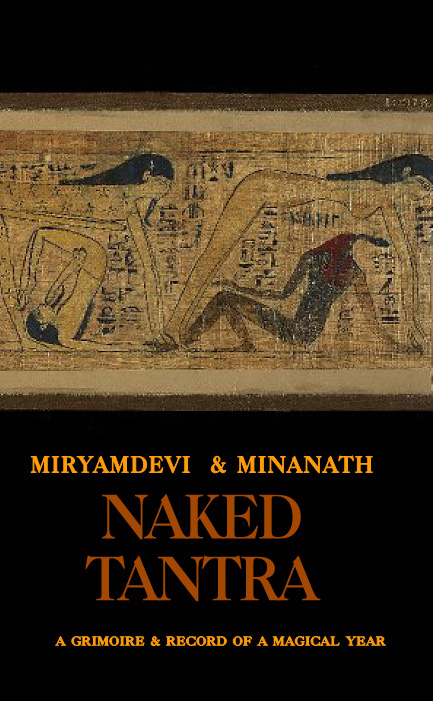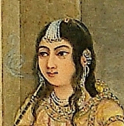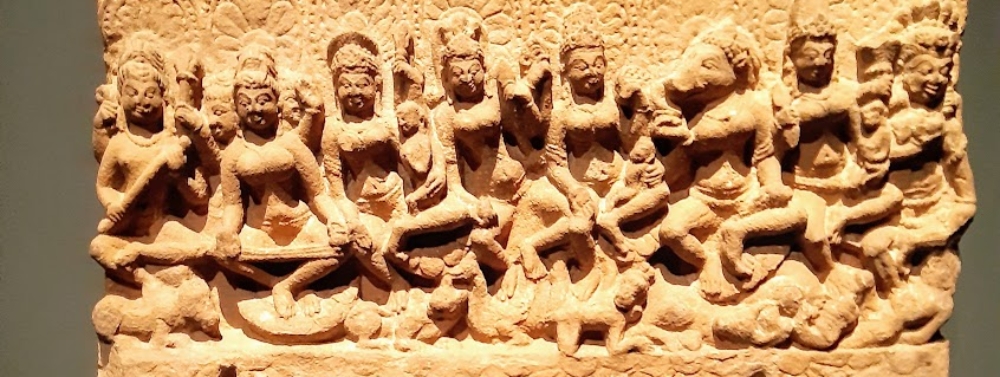
There are many books on how to do magick, but not so many with stories about actually doing it and what happens.
NakedTantra lays bare the inner states of the two brave souls involved in this extended magical work.
An experiment, two people, two countries, one mind, experimenting in tantra meta-magick, cosmic astral travel to the land of no boundaries, looking for the doors of perception.
Of necessity the contents of this grimoire might be considered erotic. And, with that thought in mind, it might also be that the reader is occasionally aroused by our story as it progresses. Some might find this an unwanted intrusion, into what is otherwise an exploration of a magical world. Others we surmise, will take this in good part, accepting that, a spoonful of sugar helps the medicine go down. To those who do not share these sensibilities, and are unmoved by what you are about to read, we offer our sincerest apologies.
Mogg Morgan talks to MIRYAMDEVI & MINANATH, pseudonymous authors of NAKEDTANTRA
About The Authors


These are not their real-world names but neither are they false, they emerged in the dialogue. In real life, they both have experience in eastern and western magical styles.
You obviously have chosen to write under names other than those of your birth, which is not uncommon in magical publishing. The story of how you came by your writerly names is told in the book so I won’t spoil the surprise now. Even so, can you introduce yourself and say a little about what you do, your aims and objectives with your writing?
Minanath:
When I first met Miryamdevi she called herself a simple “cowgirl”, which immediately brought to mind the Gopi-maidens who trail after Krishna. But then I discovered she really likes Tom Robbins who wrote Even Cowgirls get the Blues. So there’s something in that, but also, what she says about growing up on a farm; she has a certain earthiness and salt of the earth strength.
Another thing that came up when we got into working with the archetype Babalon – who we, or could be Miryamdevi, worked out, is not some rare breed but is in every woman, Miryamdevi is in a very real sense: “Everywoman”.
My name Minanath literally means (lord of) fish, and it seemed appropriate somehow. It is the name of a Hindu magician/mystic from old times. Also known as Matsyendra, Macchendra, and others. His biography can be seen as mythic or real, depending on who you read. I like the version that he worked in the sea, probably as a fisherman, a fairly taboo or lowly profession in India. But somehow he had a revelation and put together much of the spiritual system we know as Tantra. Perhaps it was because of his humble status people applied the story of his getting the wisdom from a secret scroll, written by the god Shiva, and hidden in the belly of one of the fish he caught. Sometimes it is he who ends up in the fish. But sometimes I just think he learned stuff from people he met on the harbour, maybe mariners from distant lands, like Egypt and Greece.
Anyway, my name Minanath is a reference to that guy who lived a long time ago, not thousands of years but long enough. I think magical tantra started or reemerged in India at the same time when things were getting difficult for magicians in Egypt, with the rise of Christianity. To put it romantically, when the light of knowledge was being extinguished in Egypt and the Near East, the torch passed over to India.
Miryamdevi:
Miriam (מִרְיָם Mir-yām) is described in the Hebrew Bible as the daughter of Amram and Jochebed and the sister of Moses and Aaron. She was a prophetess and first appears in the Book of Exodus.
It is all in the name actually, the name Miryam suggest the strong connection she had with the sea and water (Yam in Hebrew means sea and the very obvious Mer-Mir). In the Jewish tradition and culture, The Tambourine is widely associated with Miryam and her love for music. Within the circle of Jewish midwifery especially the Israeli ones, Miryam and her mom Jochbed were the first midwives of the Israelites. I relate to all of this as I was born near the sea, I love music and I’m a doula.
The name Miryam is very popular in my family but although all the Miryams’ are very strong women, most of them had very difficult and unhappy lives. When Minanath said that I have to choose a magickal name it didn’t take long for me to understand that I have the chance to take the name Miryam and turn it into a healing name that will heal a long ancestral line of ‘broken Miryams’. Miryam became MiryamDevi and as soon as I started to use it I felt the healing has begun.
Without giving too much away, are you able to say a little more about your family background, ie past and current – ie are you married, children, work – people like a little bit of personal stuff if you ok to share?
Miryamdevi:
I was born in Israel and grew up on the family farm. My dad was a horse breeder so we had lots of horses, I love horses, I love all animals. In my early twenties, I moved to the UK. After my husband died I moved back to Israel. No children. When Mina and I met I was living in Israel. I’m an aromatherapist and a doula.
Minanath:
I always lived in the UK originally from Wales. Divorced with no children. I work in the world of books, selling and occasionally writing them.
Naked Tantra is rather a striking title – can you say that a bit more about that, what does it signify?
Miryamdevi:
The word Naked in this particular connotation – NakedTantra, signifies the naked truth of our practices. NakedTantra is a very intimate and personal book that reveals some secrets about ourselves and the way we do things. When Mina came out with the name NakedTantra I thought it is the perfect name for the book which reveals so much about us. It feels like we are standing naked in front of the reader.
Minanath:
Miryamdevi said it really, although of course, in the first part of the book there is an account of Miryamdevi’s initiation, which like mine a few years back, and like many initiations, requires some nudity as an act of love and trust. There is a fair amount of nakedness in our book. But mostly really it’s what for us is the naked truth – revealing things as we see them. It may not be true for everyone but it is true for us. Perhaps like those energy bars that have no additives, that’s us, pure and honest, as much as it is possible for anyone to remove the mask and record what they did.
Well, that’s the Naked aspect covered. Can you explain something about the Tantrik aspect of the story? Most of our readers will have a general idea of what it means but I think, as there are so many misconceptions, it would be good if you could say what exactly you mean in this context?
Miryamdevi:
Tantra, yes, a massive subject to talk about… The way I see it, it’s all about cycles within cycles, relationships, the balance between physicality and spirituality, SivaSakti and Lingam-Yoni, Yoni-Lingam, Lingam-Lingam, Yoni-Yoni, whatever.. you cannot do all this without some Serpent Power. I think Mina is the person to ask about Tantra for a clearer answer 🙂
Minanath:
What Miryam said is really good. Miryam always has a very down to earth way of expressing things, hopefully, you noticed that in the book. But technically, Tantra is a South Asian, Indian subcontinental esoteric tradition. Like the term Yoga, I think you could translate Tantra with the western term magic, but not everyone will agree and we probably need to argue that more.
In the book Naked Tantra, you list many songs and poems, some of which you wrote or translated yourselves. Are music and poetry very special to you, can you say a little bit about that, why it is so special?
Miryamdevi:
I love music. Music is a big part of my life and there’s always something playing in the background especially when I cook or clean the house, I’ll have the radio on and will sing along and dance to my favourite tunes. I also make lots of playlists. I have playlists that will suit any mood at any time and any day, I’ve got a good ear for mixing tunes and songs and fancy myself as a secret DJ. Music helps me write. It took me ages to write chapter one, I knew what I wanted to say but the words didn’t come out. One day I was listening to the Ganesha mantra and immediately I knew what to write, so I sat down and wrote chapter one. If you read that chapter you’ll see that there are few mantras which are linked to each other, each mantra was like a key that when played the words just came out flowingly without stopping. Poetry is also very special, when Mina and I met we were living in different countries and as we both like to write as much as we like to talk we found ourselves corresponding on a daily basis via emails. Sometimes situations in life can be very lyrical and when I sit down to write about it the words flow out of me in a lyrical rhythm, a poem of sorts some may say. Separation, longing and Karessa can turn one into an enthusiastic poet.
Minanath:
Miryamdevi is the DJ. I like her style. I think we are a little part of a long tradition of mystics such as the troubadours, the Tamil Siddhas, the Bauls etc. Sometimes called courtly love, where the frisson created between two lovers, who are often separated, either by societal rules or physical distance and then their inner fantasies, their emotional energy is sublimated and channelled into poetry and storytelling. So one way or another we did a lot of writing, we still do. We do our magic, as described in the book, and we dream and write, and write and dream. We just hope our readers will enjoy the things we say, be entertained. As they say, first entertain, then educate.
Is the journey in your book, the kind of rituals you describe, would that be for everyone, a beginner or is it only for the expert?
Miryamdevi:
The journey is for anyone that resonates with our story, and the way we practice and dream.
Minanath:
Aleister Crowley, who turned up in our narrative, wrote or channelled “The Law is for All.” So yes, it’s for all. His magick was quite complex but also simple. Some like to talk about elites and special secrets they have, but it’s all out there already really. If it was all so secret we wouldn’t be writing a book about it, and in the tradition, there are thousands of old tantric texts in libraries, why did they write them if not to be read? I suppose the only qualification is the ability to read, understand, dream, do, and become.
What do you think other explorers of this genre would make your work? There are a lot of books already out there, what is it you think you bring to the table that is new?
Miryamdevi:
As I said earlier, the book is about very personal and intimate work. Some might like it and some won’t. Some might say that we lifted the veil of Isis too far … for those, I’ll say “perhaps, but there again, she gives us life”.
Minanath:
Well, we’re not too sure about that. We hope they are entertained. I hope, if there is any shock, it will be of recognition. Some will perhaps question that what we have written, whether we are entitled to say it and whether what we experienced is appropriate. Almost every book these days seems to have to dismiss the connection between western sexual magick and the obscure secrets of real tantra, to dismiss other magicians’ ideas as new age. But then, in the end, these same people will carry on writing about tantra much as we do. So I think we are on the safe ground really, we can argue our corner. And in the end, does it matter? We are part of the same international community of magic that existed in India and Egypt in the past and is with us now. Mystical traditions cannot really be judged, or if they can, it is only by the results, ie pragmatically. Success is becoming.
Ps: I have to say that in the work, Miryamdevi really has, in my opinion, revealed some amazing insights into Jewish magick, something I’ve not seen anywhere before. Or put it this way, although Miryamdevi always denies any formal knowledge of Kabbalah, it just seems to be in her blood, to flow from her naturally. Which is what she says in the book at one moment – women just naturally receive and know these things. I don’t know if this is all women but definitely her.
That’s a lot of questions – can you try and summarise, in a nutshell, the enduring message of this book?
MiryamDevi:
Follow your dreams.
Minanath:
Magic is complex but also simple. It is sometimes said that the gods created the world as a game, remembering how to play, that’s the thing.
Naked Tantra ends on a bit of a cliff-edge – without giving too much away, can you say what happened next in terms of what you are working on now?
Minanath:
Well, it seemed like the right place to stop, although the narrative obviously continues somehow and there are obviously some difficult moments ahead. The story comes to a natural climax, in more ways than one, when we break through our self imposed purdah and come together at a place of obvious power. What happens on the other side of the cliff-edge, that’s in part down to the readers.
What are we doing now? More experiments in the hyperreal – a ritual year and surprise surprise, some angelic conversations, though something very common although at the same time, ignored. It’s the old old story, people look for complexity when what they really need is staring them in the face.
